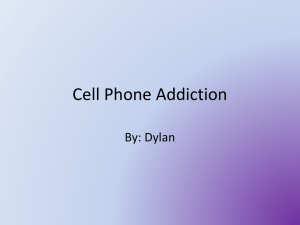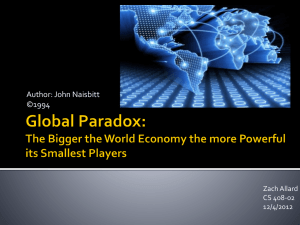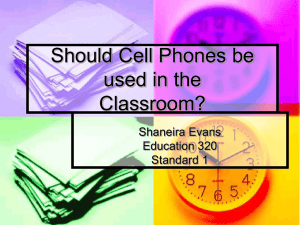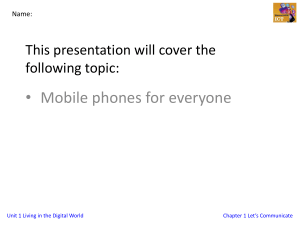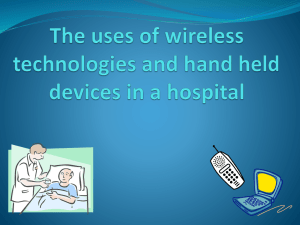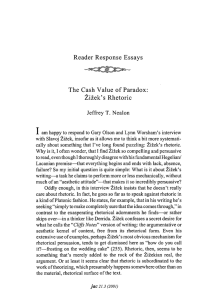Ethical - Rampages
advertisement
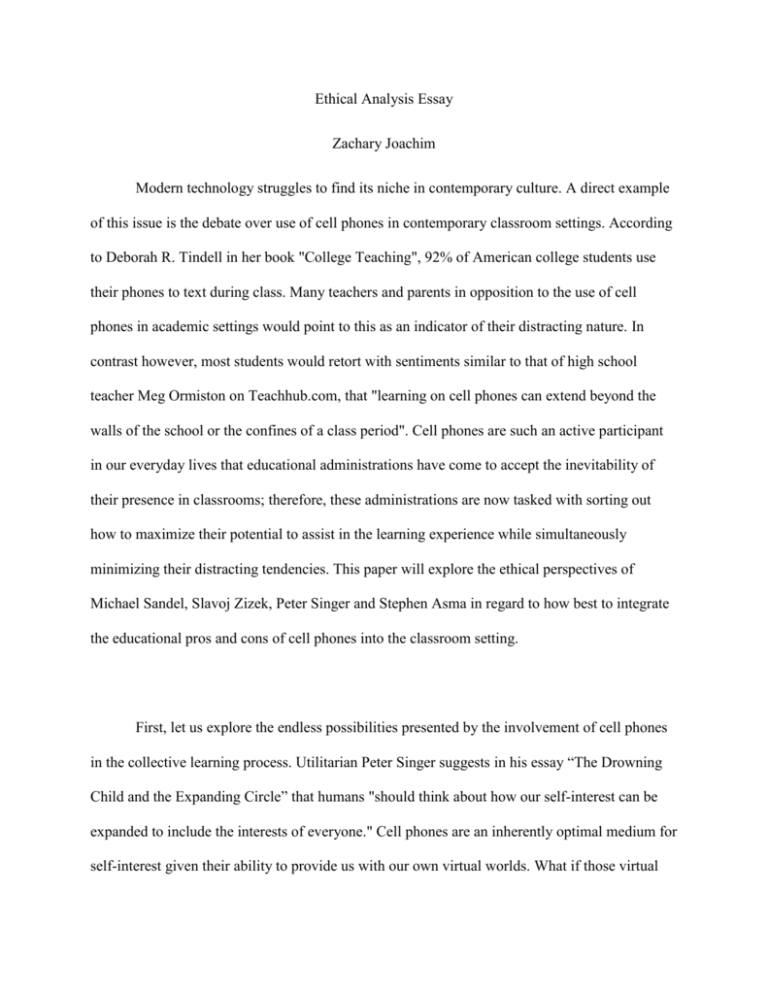
Ethical Analysis Essay Zachary Joachim Modern technology struggles to find its niche in contemporary culture. A direct example of this issue is the debate over use of cell phones in contemporary classroom settings. According to Deborah R. Tindell in her book "College Teaching", 92% of American college students use their phones to text during class. Many teachers and parents in opposition to the use of cell phones in academic settings would point to this as an indicator of their distracting nature. In contrast however, most students would retort with sentiments similar to that of high school teacher Meg Ormiston on Teachhub.com, that "learning on cell phones can extend beyond the walls of the school or the confines of a class period". Cell phones are such an active participant in our everyday lives that educational administrations have come to accept the inevitability of their presence in classrooms; therefore, these administrations are now tasked with sorting out how to maximize their potential to assist in the learning experience while simultaneously minimizing their distracting tendencies. This paper will explore the ethical perspectives of Michael Sandel, Slavoj Zizek, Peter Singer and Stephen Asma in regard to how best to integrate the educational pros and cons of cell phones into the classroom setting. First, let us explore the endless possibilities presented by the involvement of cell phones in the collective learning process. Utilitarian Peter Singer suggests in his essay “The Drowning Child and the Expanding Circle” that humans "should think about how our self-interest can be expanded to include the interests of everyone." Cell phones are an inherently optimal medium for self-interest given their ability to provide us with our own virtual worlds. What if those virtual worlds could be expanded to include classrooms? This has already begun. Students all over the country use sites such as Yik-Yak to chat during class. Imagine now, if every class a student enrolled in provided an application similar to Yik-Yak that provided a discussion board, deadlines, and readings for the course in question. Stephen Asma, an opponent of Singers, would likewise support this venture as it would render classrooms "tribes" of sorts; small, tight-knit communities capable of constant interaction, so championed in his essay “The Myth of Universal Love”. Students would be able to easily communicate with one another 24/7 about the class on a medium regulated and observed by the teacher and administration. Concepts such as this have already become popular in some higher level institutions. For example, Virginia Commonwealth University already employs a “Live Safe” application which all students are encouraged to download upon their first day of orientation. The application gives students updates on local crime as well as a quick medium through which to contact the authorities if needed, at any time of the day. If applied to classrooms, an application such as this could provide similarly useful updates on class activities, discussions and assignments, taking education “beyond the confines of the class period” as suggested by Mrs. Ormiston. Now, cell phones most certainly have their academic drawbacks. Many institutions have sought to ban their presence in the classroom because when used for their typical social reasons, they are admittedly quite a distraction. As a college student, this is evident to me in the form of daily rings and buzzes in the background of lectures that most surely detract from students' attention spans. In reference to social ideologist Slavoj Zizek in his rant “First as Tragedy, Then as Farce”, bans on cell phones merely "prolong [the] problem rather than fix [it]." Students are going to bring their phones to class ban or no ban, and so we must "reframe [the] entire system so the need for things like [bans] doesn't exist." This is where the issue becomes solely administrative. It is in the hands of institutions to weigh the current cons and potential pros of cell phones in the classroom, and it comes down to this; speaking from the perspective of political philosopher Michael Sandel in his lecture “The Lost Art of Democratic Debate”, "we need to focus on the essential nature of the activity in question." On surface level, the essential nature of a classroom is to provide an engaging collective learning experience, and the essential nature of a cell phone is to provide accessibility and convenience to one’s everyday tasks. These tendencies naturally contrast, and hence the administrations in question have not proceeded in developing ways in which we can truly use cell phones to our educational advantage. It is quite fair to ask how something so obviously distracting in the parameters of its current usage could be advantageous to the collective learning experience. Many would assert that learning isn’t supposed to be convenient, but arduous, and therefore cell phones have no place in it. Yet to many progressive thinkers, convenience in education does not mean a dip in its quality, but an opportunity for it to excel to never before imagined levels of integration into our everyday lives. This is the sticking point. A virtue of American education has always been a willingness to ignore shortcuts and learn through intensive labor because that is how information is best retained. So how does this work? How is a device designed to provide life with shortcuts supposed to help us learn? To further cite Michael Sandel, in order to resolve this quarrel we must apply the lost art of democratic debate. This so difficult because the issue of cell phone usage in the contemporary classroom setting is much more than what it appears on surface level. It is not just an argument over how to balance distractions and opportunities presented by the same medium; it is an illustration of modern technologies struggle to integrate into fields where similar thought processes have prevailed for an extended period of time. It is “old world’ versus “new world’ thinking, an ever present dichotomy in the history of humanity. For centuries our species has struggled to create new ideas and utilize them in our lives while simultaneously maintaining the virtues of established knowledge. The process of “out with the old, in with the new” is prevalently dubbed counter intuitive. We cannot loose what we have already gained for the sake of “advancement”, hence many balk at the concept of drastically altering the structure of an educational system which has had a hand in making the United States one of the most prosperous countries in the world. “If it’s not broke, don’t fix it” many would argue. This is why this subject is so difficult to break down to a form in which it can be decided through democratic debate; it is just too nuanced. In conclusion, the perspective of ideologist Zlavoj Zizek may present the beginnings of a solution. In his before mentioned rant on charity and private property, Zizek shoots down the concept of a middle ground, asserting that the issue must be allowed to compound itself in order to gain all information needed to reach polarity, and an educated solution. We are currently engaging in the debate over cell phones in the classroom in the context of this middle ground. Cell phones are generally admitted into the collective learning environment, yet in an attempt to minimize their distracting tendencies we fail to utilize them to their fullest extent. Zizek would suggest either completely abolishing them in the classroom setting or relinquishing all regulations and applying every resource possible to developing new ways to integrate them into the very same classroom setting. He and Sandel would agree that this is the only way to flesh out the situation; to allow all the pros and all the cons to show themselves in order to engage in a true, educated democratic debate over the issue, through which we can reach a solution that balances perspectives such as those of Singer and Asma. A solution that expands modern education to maximize the interests of all its adherents while maintaining the close knit, tribelike setting of the contemporary classroom. Works Cited Sandel, Michael. “The Lost Art of Democratic Debate.” TedTalks (2010). February, 2010. Zizek, Slavoj. “First as Tragedy Then as Farce.” RSA (2010). July 28, 2010. Asma, Stephen. “The Myth of Universal Love.” New York Times (2013). January 5, 2013. Singer, Peter. “The Dorwning Child and the Expanding Circle.” New Internationalist issue 289 (1997). April, 1997. Tindell, Deborah. “College Teaching.” TandFonline.com volume 60, issue 1 (2012). December 29, 2011. Ormiston, Meg. “How to Use Cell Phones as Learning Tools.” Teachhub.com Hot Tips and Topics Blog (2012). January 24, 2012.
